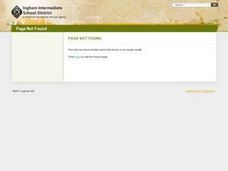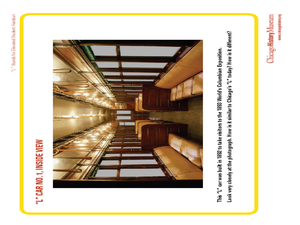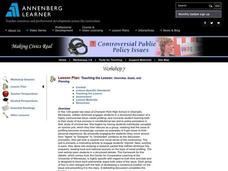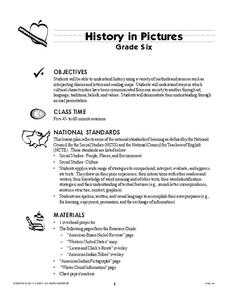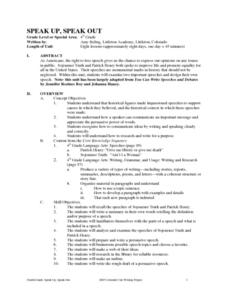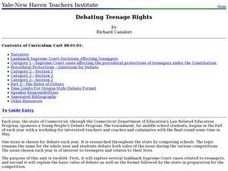US Department of Health and Human Services
Alcohol: Why Drink When You Can…
Prepare your learners to make good decisions about drinking by providing them with the real facts about alcohol and substance abuse. This resource includes several worksheets explaining how alcohol affects the brain, as well as a general...
Anti-Defamation League
Shirley Chisholm: Unbought, Unbossed and Unforgotten
A 13-page packet introduces high schoolers to a lady of amazing firsts. Shirley Chisholm was the first Black woman elected to Congress, the first Black woman to run for President of the United States, and a leader of the Women's Rights...
Curated OER
Grab Hands and Run: Understanding Human Rights
Sixth graders read the novel Grab Hands and Run by Frances Temple. They explore the effects of war on human rights. Students explore the idea that human rights are protected by the United Nations. They identify the human rights that were...
Curated OER
What And Where is Puerto Rico?: History of Puerto Rico
Students study the history of Puerto Rico. They define what a commonwealth is and how Puerto Rico became a commonwealth of the United States. They research websites for history of Puerto Rico and how it operates today. They complete...
Curated OER
What About Us? Women in the Civil War
Students research the role of women in the Civil War. In this Civil War unit, students research the role women played during the war. This unit includes eight different activities including vocabulary, writing prompts and a literature...
Curated OER
"L" Stands for Elevated
Young scholars play a trivia game to learn more about the Chicago public transportation system. In this transportation lesson plan, students also create an "L" car, and write advertising slogans for Chicago's elevated trains.
Curated OER
Racial Profiling
Students debate both positions on the controversial topic of racial profiling with support for each and then develop a consensus position on how racial profiling as a law enforcement tool should be used.
Curated OER
Immigration Debate
Students examine statements made by immigrants about immigration. They use the internet to research the truthfulness of these statements. They practice their decision-making skills.
National First Ladies' Library
How a Bill Becomes a Law
High schoolers engage in the democratic process and to learn how a bill become a law. Then they write a bill they would like as law in their classroom. Young scholars also form committees that will review the list of bills to determine...
National First Ladies' Library
Statehood for Puerto Rico? You Decide!
Students discuss the legal status of territories, commonwealths, and other jurisdictions and examine the process of moving to statehood. Groups conduct research about the question of statehood for Puerto Rico and share their research in...
Curated OER
The Great Debate: Internationalists vs. Isolationists
Students examine the opposing arguments of the isolationists and internationalists in 1941. In this debate lesson plan, the students are divided into two opposing groups representing a position in a live, in- class debate. After the...
Curated OER
Weather Reporter
Fourth graders generate an oral presentation on the weather. In this weather lesson, 4th graders watch the weather for a week and record the data on a chart. Students give a weather report at the end of the week.
Curated OER
Growing Voters and Election 2004: Get Out the Vote
Students examine the voting process, the reasons citizens should vote, and participate in a community drive to sign up new voters. After looking at websites, students create a poster that outlines the reasons to vote, participate in a...
Curated OER
Oil and its Everyday Uses
Explore the properties of oil through an experiment. They use the scientific process to investigate oil, participate in experiments, watch videos,and use information from the internet to determine how oil has changed our everyday lives.
Curated OER
History In Pictures
Sixth graders explore Lewis and Clark's expeditions. In this Lewis and Clark lesson, 6th graders view the routes they took and discuss how the territory has changed. Students make a timeline of their journey. Students research online for...
Curated OER
The Role of Affirmative Action in the Civil Rights Movement
Young scholars debate Affirmative Action. In this Civil Rights lesson students examine the development of affirmative action. Young scholars discuss whether affirmative action is advancing equality and civil rights or not.
Curated OER
Holding the Debate on the Modern Issue of Equality
Students present opening statements, along with their sign and slogan reflecting their point of view on an issue. 3. They debate the issue of whether there should be a double/single standard to promote equality in the United States...
Curated OER
Stamp Stories of Abraham Lincoln
Students build a 5 stamp collection based on the Abraham Lincoln unit theme. In this historical lesson plan, students discuss their collections within their group and build a new collection of 10 stamps. As a class, students debates the...
Curated OER
Girls Speak Out
Young scholars discuss "education" and gender equity. They examine primary sources (video clips) of women/girls who do not have the privilege of an education. They create a pamphlet that will be used to publicize the issue of girls'...
Curated OER
Speak Up, Speak Out
Fourth graders examine, compare, and summarize the speeches of Sojourner Truth and Patrick Henry. They review the parts of a good speech and design and give their own speech that expresses an opinion and persuades the listener..
Curated OER
Debating Teenage Rights
Students deal with 'real world' questions in settings that resemble Congress or the courtroom. They identify a problem, find causes, research possible solutions, determine the best solution, and plan a means of implementing the best...
Curated OER
Bill of Rights
Pupils research, list, define and discuss all the aspects to the United States Bill of Rights. They assess their foundations by James Madison and Thomas Jefferson and reflect on all the conditions happening at the time period of December...
National First Ladies' Library
Political Party History
Students research and examine the role of political parties in the history of the twentieth century of the Unites States. They divide up into groups of four to analyze the twenty-six presidential campaigns and the candidates who...
Curated OER
The President and the Press ~ FDR's First Press Conference: March 1933
Students consider that many presidential aides now speak "off the record," in essence conveying a message from the president. They examine why most Presidents have fewer press conferences the deeper they get into their terms of office.




